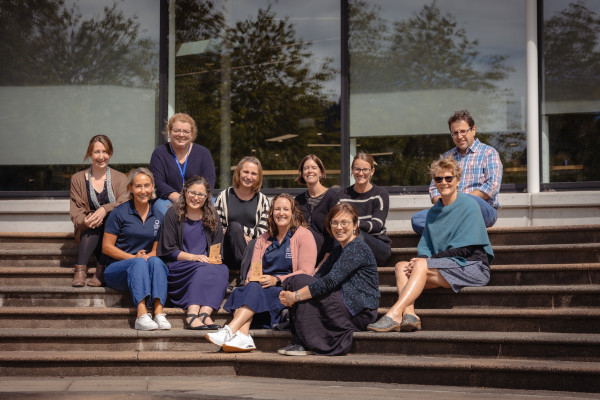- Tūhono home Hoki ki Tūhono
-
- Staff Directory
- Chief Executive Office Auckland International Office Corporate Services Finance Campus Services Functions and Catering Information Systems and Support Marketing, Communications and Engagement Learner Journey Academic Registry International Learner Services Te Punaka Ōwheo
- Learner Experience Academic Excellence Central Campus College of Community Development and Personal Wellbeing College of Engineering, Construction and Living Sciences College of Health College of Work Based Learning Open Education Resource/OERu Research and Postgraduate Studies Te Maru Pumanawa | College of Creative Practice and Enterprise
- Māori Development and Kaitohutohu Office People, Culture & Safety People and Culture Childcare Centre Te Ama Ako | Learning and Teaching Development Wellbeing and Safety Auckland Staff Directory Executive Office Academic Corporate Services Marketing and Business Development Human Resources Campus Quality and Programme Development
-
 Our people make a better world
Our people make a better world
We build the capabilities of individuals, organisations and communities and help them to realise their potential.
Staff Directory
-
- Tools
- Academic Integrity Declaration Form AIC Applications Dashboard Approved Programmes Approved Programme Fees Centralised Assessement Repository Chemwatch CMS - Tūhono & StudentHub updates Course Evaluation and Surveys CRM Applications CRM customer service hub Delegations policy/process Disability and Neurodiversity Dynamics 365 (CRM) EBS Ontrack EBS Report Email Security Personal Portal Employment Matters / Solarworkplace / Performance Reviews eTaxi eTV
- Financial Variance Reporting Hidden Disabilities Sunflower programme FCM travel intranet InPlace International entry requirements Knowledgebase articles Learner Capability Learner Support Dashboards Linkedin Learning Log a job with Marketing Login as an applicant Microsoft 365 Moderation App Moodle OP Docs OP Docs - Publishing OP Image Libraries Performance Excellence Portal Product Evaluation Panel
- Policy Library Privacy Programme and Course Design and Development Qualtrics XM RDS Remote Access Support Portal Research Database Robertson Library Staff FAQs about Graduation Status of Programmes Student Hub (Kāpehu demonstration view) Study Abroad info for learners Tūhauora I Wellbeing resources Uniprint Vault Webexpenses Auckland Tools
-
 Vault
Had an accident or near miss?
Log it here
Vault
Had an accident or near miss?
Log it here
-
- Communities
- Community AI Steering Committee Ally Network EBS Community of Interest EdTech Champions Health & Wellbeing Research Internal Evaluation Neurodiversity Professional Team Professoriate Proud@OP Student Support Website Advisory Group Web Champions Working under the Rainbow Project Learner Capability Trade Training Centre
- Committee Academic Committee Animals@OP Diversity and Equity Doctor of Professional Practice Committee Kaunihera Whakahaere - Leadership Council Internal Evaluation Learning & Teaching Leadership Team Library Committee Mental Health and Wellbeing Advisory Group Otago Polytechnic Board of Directors Pastoral Care Code Committee Programme Approvals Committee Research and Postgraduate Committee Research Ethics Committee Staff Subcommittee
- Think Tanks Mātauraka Our learners achieve educational success Pūtea Our financial success Tākata Our people, our team, our community Tiriti Our active commitment as a Treaty partner Tūroa Our commitment to be a sustainable and responsive organisation
-
 Create a community
Create a community
Do you have a community, committee or project that you'd like represented here?
Communities
-
- About OP
- Keep up to date All news All events All notices All blogs Share your info Create a news article Create an event Create a notice Create a blog
- Community and Partnerships Alumni and friends Education Foundation Operational information Academic calendar 2025 Academic calendar 2026 Current vacancies Dunedin campus map Our policies Topical FAQs
- Who we are Commemorative sites Māori Strategic Framework Our history Our strategic priorities Pasifika Strategic Framework (2025-2030) Vision and Values Working for us OP job opportunities Wellbeing Calendar Working at OP
-
New Zealand: 0800 762 786
contact us
International: +64 3 477 3014
Seen, Unseen
Author: Emily Gordon
Supervisors: Graham Fletcher Leoni Schmidt
1 September 2020
Gordon, E. (2020). Seen, Unseen. (An abstract of an unpublished dissertation submitted in partial fulfillment of the requirements of the Master of Fine Arts at the Dunedin School of Art, Otago Polytechnic, Dunedin, New Zealand).
Abstract
Emily Gordon’s work focuses on the domestic space of the home. These spaces are not warm or comforting, emotions that would normally be associated with the home, instead they are moody, uneasy and uncanny. They become what is referred to as ‘The Unhomely.’ Gordon uses her own childhood home as a reference for her drawn works and in doing so is able to uncover nostalgia and examine her own childhood fears of the home shrouded in darkness at night. Horror films have been a strong influence for her and she examines how horror has been able to create the unhomely and play off childhood fears, for example the horror trope of the monster under the bed or in the closet. Gordon also aims to engage the same sense of foreboding and dread which is present in truly successful horror films such as Alfred Hitchcock’s Psycho, 1960, and Georges Franju’s Eyes Without a Face, 1960. An aspect that becomes relevant to her is that of the partially depicted body. When the identity of the person is hidden it creates unease and ambiguity. Gordon aims to make the role of the victim and the hostile aggressor indistinguishable in her work, enabling further uncertainty. She takes inspiration from artist Michaël Borremans whose uncanny figures often have their faces turned away from the viewer, being thus exceptionally successful in creating unease. For Gordon the medium of drawing is important to her practice; she uses the properties of charcoal to leave ghostlike impressions of the hand and fingers, thus adding to the unsettling atmosphere of the work. Gordon’s large scale black and white works invoke a cinematic sensitivity and the murky greys and impregnable blacks underpin a sense of dread.
Keywords
drawing, unhomely, horror, film, uncanny, figure
License
This abstract is made available under a Creative Commons Attribution-NonCommercial licence CC BY-NC 4.0 International.
The thesis is not publicly available online. A bound hard copy is or will be available to borrow for research purposes from the Robertson Library, University of Otago.
